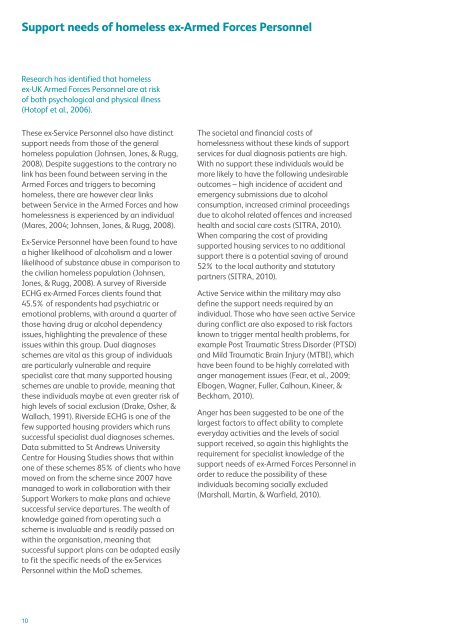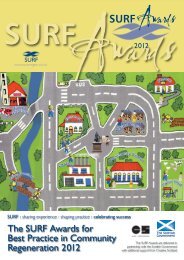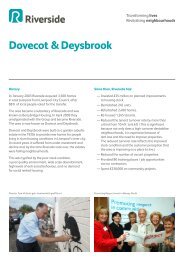Homelessness within ex-Armed Forces Personnel - Riverside
Homelessness within ex-Armed Forces Personnel - Riverside
Homelessness within ex-Armed Forces Personnel - Riverside
Create successful ePaper yourself
Turn your PDF publications into a flip-book with our unique Google optimized e-Paper software.
Support needs of homeless <strong>ex</strong>-<strong>Armed</strong> <strong>Forces</strong> <strong>Personnel</strong><br />
Research has identified that homeless<br />
<strong>ex</strong>-UK <strong>Armed</strong> <strong>Forces</strong> <strong>Personnel</strong> are at risk<br />
of both psychological and physical illness<br />
(Hotopf et al., 2006).<br />
These <strong>ex</strong>-Service <strong>Personnel</strong> also have distinct<br />
support needs from those of the general<br />
homeless population (Johnsen, Jones, & Rugg,<br />
2008). Despite suggestions to the contrary no<br />
link has been found between serving in the<br />
<strong>Armed</strong> <strong>Forces</strong> and triggers to becoming<br />
homeless, there are however clear links<br />
between Service in the <strong>Armed</strong> <strong>Forces</strong> and how<br />
homelessness is <strong>ex</strong>perienced by an individual<br />
(Mares, 2004; Johnsen, Jones, & Rugg, 2008).<br />
Ex-Service <strong>Personnel</strong> have been found to have<br />
a higher likelihood of alcoholism and a lower<br />
likelihood of substance abuse in comparison to<br />
the civilian homeless population (Johnsen,<br />
Jones, & Rugg, 2008). A survey of <strong>Riverside</strong><br />
ECHG <strong>ex</strong>-<strong>Armed</strong> <strong>Forces</strong> clients found that<br />
45.5% of respondents had psychiatric or<br />
emotional problems, with around a quarter of<br />
those having drug or alcohol dependency<br />
issues, highlighting the prevalence of these<br />
issues <strong>within</strong> this group. Dual diagnoses<br />
schemes are vital as this group of individuals<br />
are particularly vulnerable and require<br />
specialist care that many supported housing<br />
schemes are unable to provide, meaning that<br />
these individuals maybe at even greater risk of<br />
high levels of social <strong>ex</strong>clusion (Drake, Osher, &<br />
Wallach, 1991). <strong>Riverside</strong> ECHG is one of the<br />
few supported housing providers which runs<br />
successful specialist dual diagnoses schemes.<br />
Data submitted to St Andrews University<br />
Centre for Housing Studies shows that <strong>within</strong><br />
one of these schemes 85% of clients who have<br />
moved on from the scheme since 2007 have<br />
managed to work in collaboration with their<br />
Support Workers to make plans and achieve<br />
successful service departures. The wealth of<br />
knowledge gained from operating such a<br />
scheme is invaluable and is readily passed on<br />
<strong>within</strong> the organisation, meaning that<br />
successful support plans can be adapted easily<br />
to fit the specific needs of the <strong>ex</strong>-Services<br />
<strong>Personnel</strong> <strong>within</strong> the MoD schemes.<br />
The societal and financial costs of<br />
homelessness without these kinds of support<br />
services for dual diagnosis patients are high.<br />
With no support these individuals would be<br />
more likely to have the following undesirable<br />
outcomes – high incidence of accident and<br />
emergency submissions due to alcohol<br />
consumption, increased criminal proceedings<br />
due to alcohol related offences and increased<br />
health and social care costs (SITRA, 2010).<br />
When comparing the cost of providing<br />
supported housing services to no additional<br />
support there is a potential saving of around<br />
52% to the local authority and statutory<br />
partners (SITRA, 2010).<br />
Active Service <strong>within</strong> the military may also<br />
define the support needs required by an<br />
individual. Those who have seen active Service<br />
during conflict are also <strong>ex</strong>posed to risk factors<br />
known to trigger mental health problems, for<br />
<strong>ex</strong>ample Post Traumatic Stress Disorder (PTSD)<br />
and Mild Traumatic Brain Injury (MTBI), which<br />
have been found to be highly correlated with<br />
anger management issues (Fear, et al., 2009;<br />
Elbogen, Wagner, Fuller, Calhoun, Kineer, &<br />
Beckham, 2010).<br />
Anger has been suggested to be one of the<br />
largest factors to affect ability to complete<br />
everyday activities and the levels of social<br />
support received, so again this highlights the<br />
requirement for specialist knowledge of the<br />
support needs of <strong>ex</strong>-<strong>Armed</strong> <strong>Forces</strong> <strong>Personnel</strong> in<br />
order to reduce the possibility of these<br />
individuals becoming socially <strong>ex</strong>cluded<br />
(Marshall, Martin, & Warfield, 2010).<br />
As <strong>Riverside</strong> ECHG has its own specialist<br />
supported housing department dedicated to<br />
the provision of housing and support to<br />
<strong>ex</strong>-<strong>Armed</strong> <strong>Forces</strong> <strong>Personnel</strong> they are able to<br />
adapt and modify already successful support<br />
plans to aid this unique client group, for<br />
<strong>ex</strong>ample including anger management training<br />
as a part of each tenant’s licence agreement.<br />
The staff who work <strong>within</strong> this specialist<br />
branch are particularly well placed to display<br />
empathy and understanding for client needs<br />
as these services have been developed and<br />
driven by staff who, in a number of cases have<br />
themselves served in the <strong>Armed</strong> <strong>Forces</strong>,<br />
allowing them an insight into the specific<br />
issues and <strong>ex</strong>periences. The advantages of<br />
peer support are widely known due to the<br />
effect of positive role modelling (Dixon, Kraus,<br />
& Lehman, 1994) and, in the case of homeless<br />
veterans, they have been shown to be related<br />
to greater success in the transition into<br />
independent accommodation (Weissman,<br />
Covell, Kushner, Irwin, & Essock, 2005).<br />
Further distinctions from the general homeless<br />
population are that <strong>ex</strong>-<strong>Armed</strong> Service<br />
<strong>Personnel</strong> are more likely to sleep rough and<br />
for longer periods whilst homeless (Johnsen,<br />
Jones, & Rugg, 2008). A report by CHAIN<br />
suggests that around 6% of the rough sleepers<br />
in London had served in the <strong>Armed</strong> <strong>Forces</strong>,<br />
with around half of those serving in the UK<br />
<strong>Armed</strong> <strong>Forces</strong> (CHAIN, 2011). This high<br />
incidence of rough sleeping has been attributed<br />
to their survival skills training (Higate, 2000).<br />
The suggestion is that the training received<br />
ensures <strong>ex</strong>-Service <strong>Personnel</strong> have the skills<br />
and resilience to cope with sleeping rough and<br />
therefore be able to draw on these skills when<br />
accommodation is not available.<br />
A reluctance to ask for help with mental health<br />
or substance abuse issues is common amongst<br />
<strong>ex</strong>-Service homeless, which may be due to the<br />
masculine stereotype of military personnel;<br />
they may feel that asking for help or admitting<br />
to having a problem displays weakness of<br />
character and may also increase personal<br />
feelings of failure. This lack of help seeking<br />
behaviour may also be linked to a higher<br />
proportion of rough sleeping amongst<br />
<strong>ex</strong>-Services <strong>Personnel</strong>, making this a very<br />
challenging demographic to gain access to<br />
in order to provide them with appropriate<br />
support and advice (Iversen, et al., 2005).<br />
The issues above highlight the importance<br />
of supported accommodation projects to<br />
enable rough sleepers to have access to<br />
shelter should they need it, particularly in<br />
the towns and cities situated close to <strong>Armed</strong><br />
<strong>Forces</strong> bases. <strong>Riverside</strong> ECHG’s schemes at<br />
the Catterick and Aldershot bases are an<br />
<strong>ex</strong>cellent <strong>ex</strong>ample of how well used these<br />
schemes would be and therefore how essential<br />
they are to ensure the continued wellbeing of<br />
<strong>Personnel</strong> leaving the <strong>Armed</strong> <strong>Forces</strong>.<br />
The average demographics of homeless<br />
<strong>ex</strong>-Service <strong>Personnel</strong> have also been found to<br />
differ from the general population, with<br />
significantly higher mean ages and the<br />
population being made up predominantly from<br />
white males (Johnsen, Jones, & Rugg, 2008).<br />
These figures are reflective of the general<br />
demographics <strong>within</strong> the UK <strong>Armed</strong> <strong>Forces</strong>.<br />
The higher mean age may be attributed to the<br />
lack of help seeking behaviour leading to a<br />
prolonged time period spent homeless.<br />
10 11
















